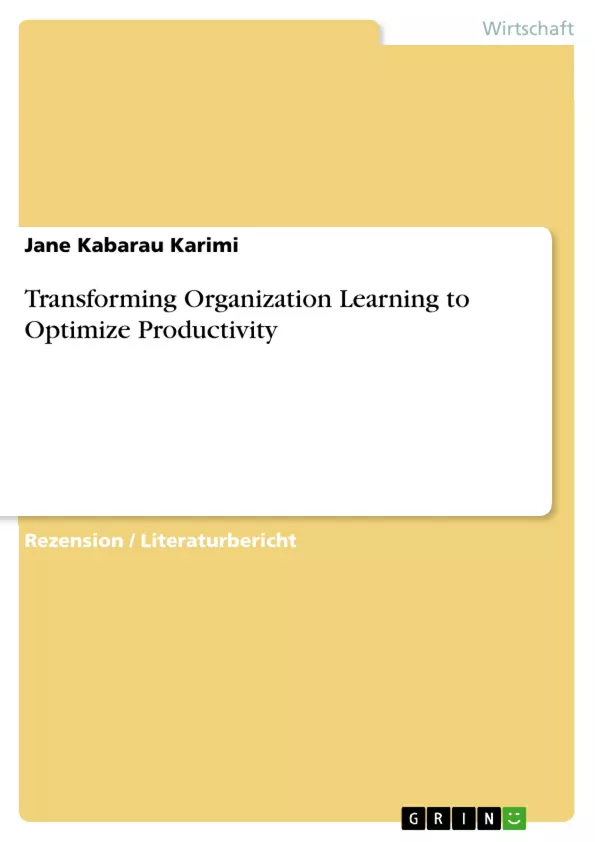The survival of an organization in today’s turbulent world depends on learning. Organizational learning helps the firms to retain and improve competitiveness, productivity and innovative abilities in ambivalent markets. Consequently, firms have heavily invested in learning resulting in the wide range of skills in their repertoire. However, the wide ranges of the skills have not been fully utilized by the organization. Such organizations are experiencing knowledge depreciation and learning redundant cycle, absorbing new information and new competencies with no fundamental shift. (Heldman, 2011)
These organizations are characterized as rigid and bureaucratic with systems and structures; creating learning disabilities opposed to knowledge sharing, flexibility, learning culture and innovations. Nevertheless, organizations that benefit from learning are organized structurally and culturally to capture and share learning, promoting inquiry and dialog and collaboration and team learning is highly encouraged. Castanede & Rio (2007) also hints that absence of knowledge sharing amount to zero learning in the organization because organizational learning and knowledge sharing are inextricably linked.
There is a need to invest in learning that brings results exemplified by a functional organization that captures knowledge and uses evidence base approach as opposed to the authority-based approach in addressing the issues arising in the organizations. The organizations need to adapt tactics that do not reward the status quo in addition to being neutral to the conflicting and competing interests of the few in favor of successful organizational learning. This article, therefore, seeks to highlights scattered and jumbled literature about the secrets lurking in functional companies and learning disabilities in dysfunctional organizations.
Inhaltsverzeichnis
- Abstract
- Introduction:
- Definitions of organization learning
- Learning process in the organization:
- Organization Learning Theories ....
- Organization learning disabilities.
- Characteristics of successful organizations learning..
- Conclusion..
- References
Zielsetzung und Themenschwerpunkte
Dieser Artikel befasst sich mit dem Thema des organisatorischen Lernens und analysiert, wie Lernen in Unternehmen zu nachhaltigem Erfolg führen kann. Der Fokus liegt dabei auf der Unterscheidung zwischen funktionalen Unternehmen, die von Lernen profitieren, und dysfunktionalen Unternehmen, die an Lernbehinderungen leiden.
- Definitionen des organisatorischen Lernens
- Lernprozesse in Unternehmen
- Lernbehinderungen in Unternehmen
- Merkmale erfolgreicher Lernunternehmen
- Zusammenhang zwischen Wissensteilung und organisatorischem Lernen
Zusammenfassung der Kapitel
- Abstract: Der Text stellt die Notwendigkeit des organisatorischen Lernens im heutigen turbulenten Umfeld heraus und beschreibt die Herausforderung, dass viele Unternehmen trotz Investitionen in Lernprogramme nicht in der Lage sind, das erworbene Wissen effektiv anzuwenden.
- Introduction: Dieser Abschnitt beleuchtet die Bedeutung des Lernens für das Überleben von Unternehmen in einer dynamischen Welt. Er betont die Notwendigkeit, sich an Veränderungen anzupassen und die Bedeutung von Lernen für die Steigerung der Wettbewerbsfähigkeit und Produktivität.
- Definitions of organization learning: Hier werden verschiedene Definitionen von organisatorischem Lernen vorgestellt, die sich sowohl auf die Aneignung von Wissen, Fähigkeiten und Einstellungen als auch auf die Interaktion und Zusammenarbeit von Mitarbeitern konzentrieren.
- Learning process in the organization: Dieser Abschnitt beschreibt den Lernprozess in Unternehmen, der sowohl individuelle als auch Gruppenlernen umfasst. Er beleuchtet die verschiedenen Perspektiven auf Lernen aus sozialer und kognitiver Sicht.
Schlüsselwörter
Die zentralen Schlüsselwörter und Themen dieses Artikels umfassen organisatorisches Lernen, redundante Lernzyklen, Organisationsstruktur, funktionales Unternehmen, Wissensteilung, Lernbehinderungen und Wissenstransfer.
- Citation du texte
- Jane Kabarau Karimi (Auteur), 2014, Transforming Organization Learning to Optimize Productivity, Munich, GRIN Verlag, https://www.grin.com/document/307011



